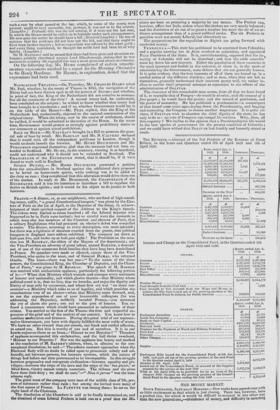NAVIGATION TREAT rEs.-On Thursday, Mr. Ciffirtr.Es , GRANT asked Mr. Peel,
whether, by the treaty of Vienna in 1815, the navigation of the Rhine had not been thrown open to all the powers of Europe ; and whether, hi point of fact, the King of the Netherlands (lid not contrive to monopo- lize all the commerce of the river ? A second treaty had, he understood, been concluded on the subject : he wished to know whether that treaty had been brought to a 'conclusion ; and if so, whether Government would lay it on the table of the House ?-Mr. PEEL replied, that the King of the Netherlands had, undoubtedly, objected to the natural construction of the original treaty. When the treaty, now in the course of settlement, should be ratified, it would be submitted to the notice of the House. In the mean time, Government would protest as strongly against prohibitory duties in our commerce as against actual prohibition. SALE OF BEEn.-Mr. CALCRAFT brought in a Bill to promote the gene- ral sale of beer by retail. Mr. BARCLAY and Mr. N. CALVERT declared that it would ruin all the independent publicans in London, though it would no doubt benefit the brewers. Mr. HOME DRUMMOND and Mr. FERGUSSON expressed themselves glad that the measure had not been ex- tended to Scotland. Mr. HUME, on the contrary, viewing it as beneficial, could not understand why it should not be extended to Scotland. The CHANCELLOR of the EXCHEQUER stated, that it should be, if it were found to work well in England. SPIRIT DUTIES. - Mr. HOME DRUMMOND presented a petition from the corn-distillers in Scotland against the additional duty proposed to be levied on home-made spirits, while nothing was to be added to the duty on rum : they complained that this alteration would drive them out of the market. In reply to Mr. Drummond, the CHANCELLOR of the EXCHEQUER said it was his intention to introduce a bill to regulate the duties on British spirits ; and it would be his object to do justice to both interests.


















 Previous page
Previous page